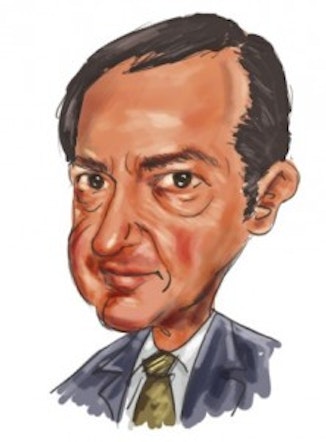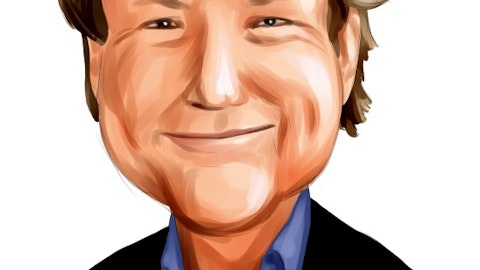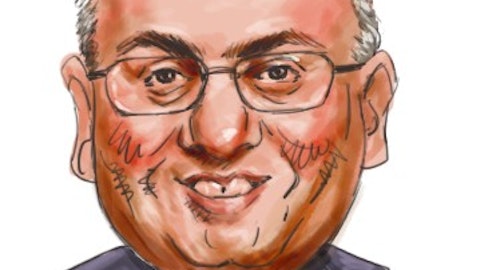
One of the hedge funds run by John Paulson, whose prescient bets against housing where chronicled in the book “The Greatest Trade Ever,” is on track to be the second worst performer of 2012 among the universe of funds tracked by HSBC. Last year, it was the worst. Paulson’s Advantage Plus fund, which uses additional leverage than his other funds, is down 19 percent through the end of October, following a 53 percent loss last year. The fund bests just the Conquest Macro Fund, which is down 27 percent through the end of November.
Views diverge between hedge fund investors and managers: survey (BusinessTimes)
Hedge fund managers and investors are not seeing eye to eye on a number of issues, if the results of a hedge fund market survey released by Ernst & Young on Tuesday are anything to go by. For one thing, the perceived benefit of hedge fund regulation is deteriorating among investors. Of the 50 institutional investors polled, only 10 per cent felt that regulations effectively protect their interests, while 85 per cent did not believe these requirements will help prevent the next financial crisis. Investors and managers are also drifting further apart in their views on aligning compensation with risk and performance.
Nobel Prize to Get Hedge Fund Boost After Awards Sink 20% (BusinessWeek)
The Nobel Foundation, which this year lopped 20 percent off its cash prizes, is planning to invest more money through hedge funds to boost its returns and restore the award to its previous size. “When we look at the analysis we see that we can get more return with less risks by doing that,” Executive Director Lars Heikensten said in an interview at the Nobel Foundation’s Stockholm headquarters yesterday. “If we can choose hedge funds that we trust, then we can get better returns for given risks.” The fund “probably shouldn’t” be fully invested in debt securities, he said.
It’s a free country, so legalize insider trading (CourierPostOnline)
Insider trading leads the news again, casting a cloud over Steven Cohen’s SAC Capital Advisors $14 billion hedge fund. The SEC charged Mathew Martoma, who used to manage a SAC Capital division, with using inside information about tests on an Alzheimer’s drug to trade stock of the company working on it. The media love this stuff. I imagine reporters sitting around saying: “The SEC finally will punish greedy Wall Street! These tycoons rig the game — cheating is how they acquire $14 billion — and now noble government prosecutors will bring justice.” But this is nonsense. Government prosecutors are as ruthless and greedy as anyone. It’s easy to hate the rich — and in our bailout economy there are reasons for suspicion. But capital doesn’t find the best outlets by itself. Hedge funds spot promising opportunities and quickly direct capital that way. Their reward is profit. When government interferes with that, we all suffer.
Hedge funds’ employee cost overheads differ by thousands (Equities)
HEDGE fund overhead costs for individual employees differed by thousands of pounds between firms last year, with some funds spending up to £10,000 a day on each employee, research shows. Research obtained from Hedge Forensics shows the most costconscious UK hedge fund has managed to cut its overhead costs down to as little as 50p a day for each member of staff. The data, taken from the firm’s Top 200 Report, which ranks data on the UK’s hedge fund community, shows some smaller boutique funds are spending £10,000 a day per person for prime office space in Mayfair, the traditional home to the UK’s hedge fund community.
Hedge Fund Managers Jumping Ship After Years of Losses Reports the Copycat Club (Melodika)
San Francisco, CA- Hedge funds managers are finding it exceedingly difficult to generate quality returns, so much so that some are closing up shop. The supposed grand-masters of high-earning in any market are hitting a wall when it comes to generating a high rate of return for their efforts. Years of difficult market landscapes have made things difficult. Being hide-whipped by politicians time and again in the last half-decade has not helped things either. For this and other reasons, investors are increasingly prepared to pull out of the market altogether. Edoma Partners, which is one of the most talked about funds to launch since the the 2008 crisis, stated on Thursday that it would be closing. The announcement comes only two years after starting their endeavor.
Dyal Capital Partners closes at USD1.28bn (HedgeWeek)
The fundraising effort exceeded Dyal’s goal of USD1bn. Investors included sovereign wealth funds, public and private pensions, multi-employer pensions, insurance companies, endowments and foundations, family offices and private banks. Dyal’s strategy is to purchase minority equity interests in a portfolio of approximately 12 to 15 institutional hedge fund management companies, diversified by strategy and geography. These relationships will be structured for the long term, as Dyal has raised a dedicated pool of permanent capital to execute these transactions.
Protections in hedge-fund proposal axed: Aguilar (MarketWatch)
A series of investor-protection provisions were removed from a hedge-fund advertising proposal on the eve of a vote on it, a top commissioner on the Securities and Exchange Commission told reporters Monday. “I was very disappointed that the rule as proposed did not include any of the pro-investor initiatives many commenters had written in about,” Democratic Commissioner Luis Aguilar told reporters after speaking at an accounting conference.
ATA RiskStation launches risk reporting solution for hedge funds and family offices (HedgeWeek)
“Our proprietary risk system fills a clear market gap for cost-effective but comprehensive risk modelling,” says Aladin Abughazaleh, ATA RiskStation’s founder. “Our core premise is that no single measure of risk is perfect or reliably models downside exposure in all market conditions and for all portfolio types.” The service offers clients the ability to set up highly customised risk scenarios that use a variety of Value at Risk and stress testing models. In addition, for each model, clients can define a broad range of associated inputs or parameter sets. The analytics included in the system’s risk reports are powered by RiskAPI, PortfolioScience’s on-demand API-based risk analysis service.
TCW adding direct lending, hedge fund strategies (PIOnline)
TCW Group is adding hedge fund and direct lending strategies with the acquisition of the special situation business of credit investment manager Regiment Capital Advisors and a joint venture with hedge fund manager Scoggin Capital Management, confirmed Peter Viles, TCW spokesman. Terms on either deal were not disclosed. When the deal closes, the Regiment group within TCW will focus on direct lending to middle-market companies. Regiment’s special situation business currently has $2 billion in committed and invested assets. Its last fund was the $1.7 billion Regiment Capital Special Situations Fund V, which closed on July 1, 2011.
Hedge Funds Prioritize Technical Compliance Over a Culture of Governance, According to Corgentum Consulting’s Investor Survey (TimesUnion)
Corgentum Consulting, the leading provider of the industry’s most comprehensive hedge fund operational due diligence reviews, today announced the results of a survey that shows the majority of investors (72%) feel hedge funds are focused on achieving only the technical compliance, versus pursuing a culture of governance, when it comes to regulatory preparedness. “The post Dodd-Frank environment has brought increasingly complex technical requirements for hedge funds, such as the recent SEC registration requirements and Form PF filings,” said Jason Scharfman, Managing Partner of Corgentum Consulting. “Investors are increasingly observing that fund managers have become strapped for resources by complying with these new technical rules and have moved away from instilling best practices.”
Hedge Funds: Victims of the Financial Crisis, or Not? (ai-CIO)
How has the financial crisis impacted hedge funds and the existence of fire sales, which occurs when these investors experience outflows and sell stocks that are common across their portfolios? One newly released academic paper by Nicole Boyson of Northeastern University, Jean Helwege of University of South Carolina, and Jan Jindra of Ohio State University investigates hedge fund stock trading from 1998 and 2010 to test for fire sales. The paper argues against a commonly held view of hedge funds in the subprime crisis, which describes them as victims of severe outflows and margin calls that forced them to sell assets into a declining market. “While many of the stylized facts suggest that the financial crisis was exacerbated by forced sales of stocks by hedge funds, our analysis suggests otherwise,” the report concludes.
‘Soft’ increase seen for base money manager salaries in 2012 (PIOnline)
Base salaries for money management professionals are projected to increase 3.5% in 2012 with incentive pay projected to rise up to 10%, according to a new study from Greenwich Associates and Johnson Associates. …Hedge fund professionals are projected to earn about 1.8 times that of people at traditional money management firms in both buy-side equity and fixed income, in line with the previous year, and are projected to remain fairly stable in the short and medium term. However, traditional fixed-income professionals are making headway; in 2010, hedge fund professionals were making about 2.4 times that of traditional firms in the fixed-income asset class. Equity hedge fund professionals are projected to make about 1.85 times that of traditional buy-side equity professionals in 2012, nearly identical to 2011 numbers; traditional equity professionals actually made about 1.05 times more than hedge funds in 2010.
San Francisco HF Manager Retires (HedgeFund)
The co-founder of a San Francisco-based hedge fund firm is stepping down from his post at the end of the year. Reuters reported that David Scially, who oversees a large portion of Kingsford Capital Management’s AuM, is retiring to spend more time with his family. The article also said that the firm has had some time to prepare for Scially’s departure.
Vision Opportunity Fund Limited Partnership recognized at the 2012 Morningstar Canadian Investment Awards (NewsWire)
Vision Capital Corporation (“Vision”) is pleased to announce that the Vision Opportunity Fund Limited Partnership (the “Vision LP”) was recognized with an award as one of the Top 3 Best Opportunistic Hedge Funds in Canada at the 2012 Morningstar Canadian Investment Awards. This is the second consecutive year that Vision has received this recognition. Vision’s unique and differentiated strategy, in conjunction with the experience of the Vision team, has generated strong absolute and risk-adjusted total returns for the Vision LP. Since its inception on July 2, 2008, through October 31, 2012, the Vision LP has delivered a 25% compounded annual return, net of fees and expenses, representing a cumulative total return of 164%.
Billionaire Ken Griffin Likes Halcon for Oil and Gas (InsiderMonkey)
Citadel Investment Group, a large hedge fund managed by billionaire Ken Griffin, has acquired 11.2 million shares of oil and gas company Halcon Resources Corp (NYSE:HK). According to a 13G filed with the SEC, Citadel now owns 5.2% of the shares outstanding. Citadel’s 13F filing for the third quarter of 2012 showed that the fund had owned 8.9 million shares at the end of September, nearly triple what it had owned three months earlier, and clearly the fund has continued buying shares over the last two months. Find more of Griffin’s stock picks from the end of September. We covered a large insider purchase at Halcon in mid September (read more about the $700,000 insider buy). In addition, our database of insider trading filings shows buying by eight different insiders in November.
Kincaid: George Soros Wins Big Over Karl Rove (GOPUSA)
Fox News contributor Karl Rove was criticized in the media for objecting to the channel calling Ohio for Barack Obama on election night. The state of Ohio did in fact go for Obama and the channel was correct in making that prediction. Like many other Fox News commentators, Rove had mistakenly forecast a Romney victory. He was only alone in thinking this was still possible as election night wore on and the results from Ohio came in. A more important controversy, however, is what Rove, former Deputy Chief of Staff and Senior Advisor to President George W. Bush, did with the $300 million that he raised from conservative donors for the purpose of defeating Barack Obama and electing a Republican Senate.
Icahn Sees Second-Time Charm as Greenbrier Value Falls: Real M&A (SFGate)
For Carl Icahn’s pursuit of Greenbrier Companies Inc (NYSE:GBX), the second time could be the charm after the railcar maker fell to its lowest valuation in six years. Icahn disclosed a 9.99 percent stake in Greenbrier last month and sought to discuss options with management four years after dropping an attempt to link up the company with American Railcar Industries, Inc. (NASDAQ:ARII). The activist investor resurfaced after a more than 40 percent drop in the shares left Lake Oswego, Oregon-based Greenbrier at its cheapest price relative to earnings since 2006, according to data compiled by Bloomberg.
SEC Staff to Host Decimalization Roundtable (SEC)
The Securities and Exchange Commission today announced that its staff will host a roundtable early next year to discuss the impact of decimal-based stock trading on small and mid-sized companies, market professionals, investors, and U.S. securities markets. The roundtable will be held on Feb. 5 at the SEC’s Washington, D.C., headquarters, and will be open to the public and webcast live on the SEC’s website. Information on the agenda and participants will be issued shortly.
Hedge Funds Win as Europe Will Pay More for Greek Bonds (Bloomberg)
Hedge funds invested in Greek debt are poised to be winners after European policy makers flinched and raised the price for how much the recession-stricken country would pay to buy back its bonds. Hedge funds drove up prices for Greek sovereign debt last week after determining that European finance ministers would back off a pledge to pay no more than about 28 percent of face value to retire the nation’s bonds. Money managers correctly wagered that not enough bondholders would participate at that level to get the deal done. That would put at risk bailout funds that Greece needs to stave off economic collapse.





